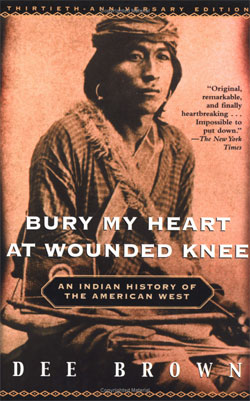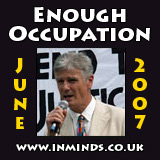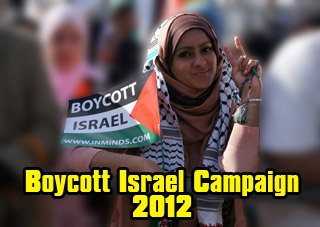
 Innovative Minds © 2014. All Rights Reserved. www.inminds.co.uk | ||||
Is it Apartheid?Moshe Machover  Bury My Heart at Wounded Knee: An Indian History of the American West by Dee Brown
All colonial settlers' societies built themselves up on exploiting the resources of the country that they colonized: primarily its land, which they wrested from the indigenous people, who became dispossessed. The decisive difference between the two species was what was to become of the dispossessed natives.
In recent months there is a growing tendency among opponents of Israeli oppression and defenders of Palestinian rights to refer to Israeli policy towards the Palestinians as "apartheid". The "separation wall" that Israel is constructing on Palestinian lands is often denounced as the "apartheid wall". An International conference on Palestine scheduled for 5 December 2004 at the School of Oriental and African Studies in London is entitled by its organizers as "Resisting Israeli Apartheid: Strategies and Principles". I would like to warn against an unthinking use of this misleading analogy between Israeli policy and that of the defunct apartheid regime in South Africa. It is theoretically false and politically harmful. To be sure, the two have many features in common. Both are perniciously racist; both impose a degree of separation between ethnic groups. And this is no accident: both are instances of the genus colonial settler state. Indeed, Israel and apartheid South Africa were, until the latter's demise, the last two surviving active instances of this genus.[1] Now Israel is the only remaining one. But the point is that they belong to two distinct species of the genus. All colonial settlers' societies built themselves up on exploiting the resources of the country that they colonized: primarily its land, which they wrested from the indigenous people, who became dispossessed. The decisive difference between the two species was what was to become of the dispossessed natives. In one model of colonization, their labor power became one of the indigenous resources - indeed, the main resource - to be exploited by the settlers. The ethnic conflict between the two groups thus assumed the nature of a kind of class struggle. This model is represented, in almost pure form, by apartheid South Africa. In the other model, the native population was to be eliminated; exterminated or expelled rather than exploited. Israel is an active instance of this model. If you wish to find an instructive parallel, look not at South Africa. Rather, read Dee Brown's Bury My Heart at Wounded Knee: An Indian History of the American West. Apartheid was a device for keeping the exploited natives - the majority of the population - as part of the same economy, and therefore essentially also of the same society, as the settler exploiters; but without actually admitting it, and without giving the former rights of citizenship. Officially, the natives were citizens of fake states, the Bantustans. But the last thing the architects of the apartheid state wanted was a real departure of the black Africans, whose labor power was vital for its economy. Zionism never intended to create a Palestinostan for the Palestinian Arabs. From the very start, it planned to get rid of them, to create a purely Jewish "Land of Israel". This premeditated policy - referred to in Zionist literature as 'transfer' - was largely implemented in the 1948 war. The Palestinian Arab minority whom - for lack of time or opportunity â the nascent Israeli state failed to expel from its territory did not seem to represent a major "demographic threat". To be sure, their lands were for the most part expropriated and given over to Jewish settlements, they were severely discriminated and for many years kept under military rule. But, crucially, they were not denied rudimentary citizenship rights. They are Israeli citizens, who can vote for the Knesset. A new problem arose following the June 1967 war. Israel found itself controlling the whole of Palestine as well as a part of Syria. But, from the Zionists' viewpoint, this great territorial acquisition of their wet dreams came with an encumbrance: a large Arab population, many of them refugees of the 1948 ethnic cleansing and their descendants. This population, which "remained 'stuck' to their places," the Zionists realized, "may destroy the very foundation of our state."[2] Israel managed to ethnically cleanse some of the newly occupied territories, such as the whole of the Golan Heights, the Latroun salient in the approaches to Jerusalem, and some refugee camps near Jericho. But the bulk of the population of the West Bank and Gaza Strip still "remained stuck to their places."
Pragmatic Zionists looked for a Palestinian leadership to do the job for them: to control and repress the Palestinians, thus guaranteeing the security of Israel. This was the essence of the Oslo Accord.
Zionists of all major parties - Labor and Likud alike - ardently wished to 'transfer' as many Palestinians as possible. The only difference was about what was considered possible. The more pragmatic or cautious among them thought that the 'world' (which for Israel meant primarily US politicians and opinion-manufacturers) would not allow a massive ethnic cleansing. On the other hand, it was becoming clear, especially during the first Intifada, that Israel could not afford to control the Palestinian population directly. These more pragmatic Zionists looked for a Palestinian leadership to do the job for them: to control and repress the Palestinians, thus guaranteeing the security of Israel. This was the essence of the Oslo Accord, which Peres managed to sell to Rabin and, no less important, to Yasser Arafat.[3] The Oslo plan, had it materialized, would indeed have led to something like a Palestinian Bantustan, resulting in a convergence of the Zionist settler state towards the apartheid model. But this was not to be. The plan was vigorously opposed by more optimistic or fundamentalist Zionists, such as Ehud Barak in the Labor Party and most of the leaders of Likud. Just in time, Rabin was assassinated. The Netanyahu government which followed stalled the implementation of Israel's side of the Oslo bargain, thus subverting it. The next Israeli prime minister, Labor's Ehud Barak, continued this policy at Camp David by a more subtle means: dictating to Arafat new conditions, falsely packaged as a 'generous offer', that even he could not accept. The next prime minister, Ariel 'Bulldozer' Sharon, true to his legendary brutality and blood lust, has pursued yet another tactic: smashing the Palestinian Authority's resources and at the same time deliberately provoking Palestinian suicide bombings, so as to expose Arafat's inability to serve as Israel's security guard, and thus prove his uselessness and irrelevance from a Zionist viewpoint. What Sharon & Co are planning is not really an apartheid regime. They are not interested in keeping the Palestinians permanently in place, as a subjugated population. They are planning to ethnically cleanse as many Palestinians as possible. Of course, this requires what in Zionist parlance is referred to as she'at kosher, an opportune moment. A general upheaval in the Middle East may present a suitable opportunity. If necessary, it could actually be provoked. Meantime, as a purely temporary measure, the Palestinian population is to be atomized and separated - not only from the Israeli Jews but also within their own community, village from village, neighborhood from neighborhood. And make no mistake: this is not going to be like a Bantustan, more like a series of Indian Reservations. Conflating this with apartheid in fact misses the most essential point. Incidentally, it can also backfire: defenders of Zionism can easily show that the Palestinian citizens of Israel, while not enjoying equal rights, are nevertheless considerably better off than Black Africans used to be under apartheid. But, much more importantly: talk of Israeli 'apartheid' serves to divert attention from much greater dangers. For, as far as most Palestinians are concerned, the Zionist policy is far worse than apartheid. Apartheid can be reversed. Ethnic cleansing is immeasurably harder to reverse; at least not in the short or medium term. To be sure: there is one great difference between the Zionist colonization project and that of the United States. When the US achieved its 'manifest destiny' and reached from ocean to ocean, grinding to dust the indigenous people - that was that: no more 'Red Indians' to hunt and uproot. In the case of Zionist Israel, no matter how far it can expand - and surely it will need to expand further in order to protect and defend its former expansion - it will always be confronted and surrounded by Arabs. If the Arab world will one day unite, it can defeat and reverse Zionist expansionism. But this will require a far-reaching transformation of the Arab World, defeat of its present ruling classes and unification of the Arab nation. References [1]There are of course several other states that started off in this way; but they have ceased to be active in a sense similar to that in which an extinct volcano still exists as a mountain, but is no longer active as a volcano. [2]Joseph Weitz, 'A solution to the refugee problem: a State of Israel with a small Arab minority', Davar, 29 September 1967. Davar was the Histadrut daily, in effect organ of the Israeli Labor Party. Weitz was member of that party, an apparatchik who had played a central role in planning the transfer before 1948 and implementing it during 1948/49. [3]I have dealt elsewhere with the reasons for Arafat's acquiescence in accepting what amounted to little more than the job of Israel's proxy Palestinian Police Chief. Source: http://www.academicsforjustice.org/pMachine/more.php?id=1719_0_1_0_M2 Also Of InterestPage URL: http://inminds.com/article.php?id=10132
|
|
Support Us
If you agree with our work then please support us.Campaigns INMINDS Facebook Live Feed Latest Video's
INMINDS Twitter Feed Tweets by @InmindsComFeatured Video's
You need Flash player 8+ and JavaScript enabled to view this video.
[all videos (over 200)..] Featured MP3 Podcast  "The truth is this is not really an occupation of the West Bank at all, its colonisation - aggressive on going colonisation! There are now nearly half a million permanent settlers in the West Bank. Pristine hill top settlements are omnipresent and canonise the West Bank. Whatâs more they breed yet more electric fences, moats, Jew-only roads, road-blocks, checkpoints, soldiers - over 500 of them. Imagine if this situation was reversed, if it was the Palestinians doing this to the Jews would the reaction of this government and the world be the same? I don't think so." House of Lords Enough Occupation Rally, June 2007 [6min / 3Mb] [all podcasts..] Newsletter Feedback |
 |
 |












































